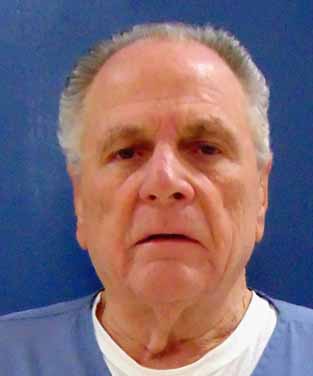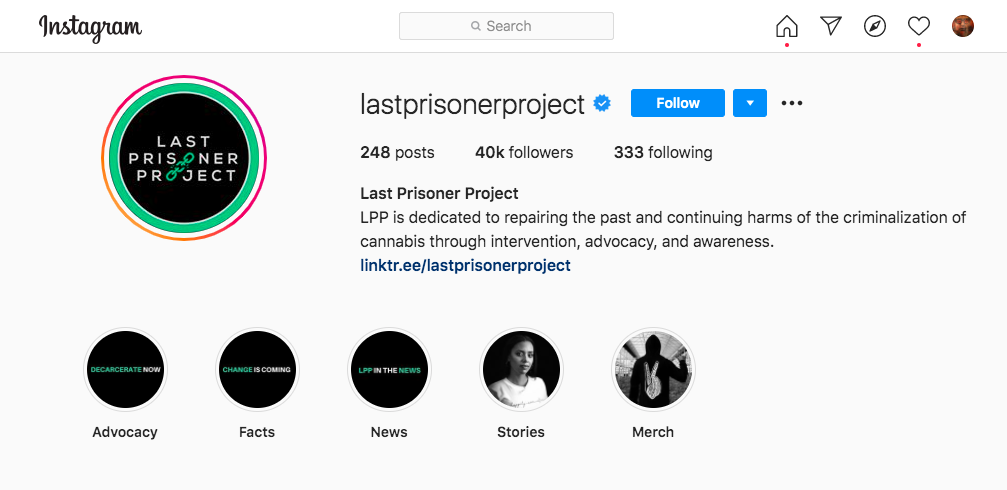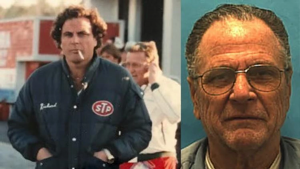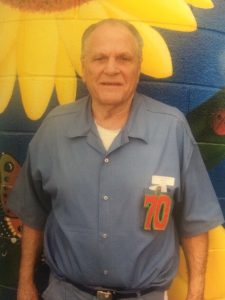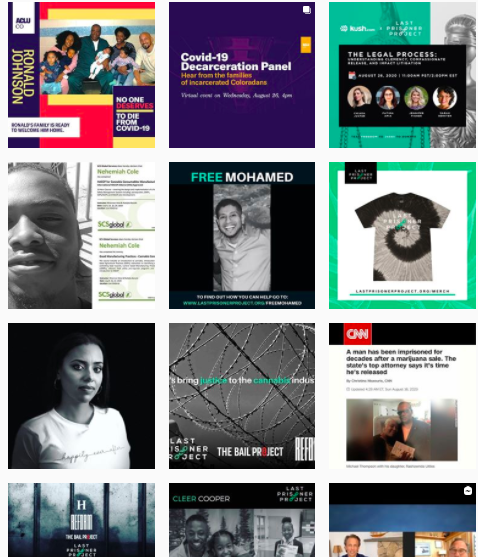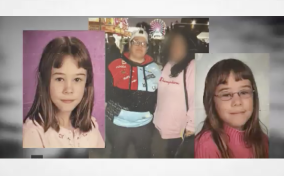In late August 2020, at the time this article was written, more than 5,000 prison inmates in Florida have tested positive for the coronavirus as of late July, but that number most likely does not include the most recent information. Nor does that number account for the sheer volume of Florida’s yet-unreported coronavirus cases.
If you wish to re-publish this story please do so with following accreditation
AUTHOR: Heather Allman
PUBLISHER: CANNABIS LAW REPORT
Spotlight on Last Prisoner Project
FIGHTING CRIMINAL INJUSTICE AND RE-IMAGINING DRUG POLICY
Imagine sitting in a cell for years, decades, or even for life, convicted of an activity that is no longer a crime, while thousands of other people build intergenerational wealth doing exactly the same thing.
That is the situation that over 40,000 cannabis prisoners face today in the United States alone, while countless others languish in jails and prisons worldwide. The Last Prisoner Project is a nonprofit coalition of lawyers, cannabis industry leaders, executives, and artists dedicated to bringing restorative justice to the cannabis industry.
Extensive LPP information about their representation of Richard DeLisi is available online
Please visit the website
LIFE IN PRISON FOR CANNABIS: Free DeLisi
for more information on how you can help
In late August 2020, at the time this article was written, more than 5,000 prison inmates in Florida have tested positive for the coronavirus as of late July, but that number most likely does not include the most recent information. Nor does that number account for the sheer volume of Florida’s yet-unreported coronavirus cases.
Throughout Florida, testing availability is scarce at best. Even the state’s existing COVID-19 initiatives for freely independent citizens are being barraged with test requests and deluged with results.
Ongoing, rapid testing for the state’s large inmate population is simply not a current priority for the embattled state, especially in the midst of the multitude of crises currently enveloping the United States.

Last Prisoner Project Volunteer Team: (Chiara Juster, Elizabeth Buchanan, Michael Minardi, Mariah Daly)
While a Florida judge may not have intentionally sentenced Richard DeLisi with the death penalty in mind back in 1989, that is exactly what he faces today in 2020 if he remains under lockdown at the state’s South Bay Correctional Facility.
Fast forward to August 17, 2020, when I spoke briefly to Mariah Daly and Chiara Juster, who are assisting the Last Prisoner Project in the current push for clemency for Richard DeLisi.
DeLisi has the unique and dubious distinction of being the longest serving, non-violent inmate in the United States.
Cannabis Law Report: Please explain how you are related to Richard DeLisi’s ongoing case, and the push for clemency?
Mariah Daly: “I work as a Legal Fellow for LPP and am Richard’s LPP advocate: to speak up for those who cannot speak for themselves, to ensure justice for those being crushed, and to speak up for all and see that they get justice.”
Chiara Juster: “I am Richard DeLisi’s lead attorney, and Michael [Minardi] is also one of Richard’s pro bono attorneys. All of us were matched through LPP’s volunteer program. I am also in the process currently of becoming one of the Legal Advisors at Last Prisoner Project, which I will talk a little more about later.”
CLR: Tell me about Richard —how is his case tied to your larger work at the Last Prisoner Project?
MD: “Richard DeLisi is a truly special person, one of many whom are incarcerated for cannabis during these very trying times… Richard is the longest serving non-violent cannabis offender in the United States; this alone is unjust. Sentences, like Richard’s, for non-violent cannabis offenses evolving into a death sentences, because of the pandemic, is truly reprehensible.”
CLR: How do prisoners end up with lawyers, such as yourselves, for the last prisoner project — how exactly are the lawyers assigned or selected for the Last Prisoner Project?
MD: “Attorneys are matched with LPP constituents through our volunteer matching program. Attorneys can volunteer by filling out a form here. Next, they are added to our volunteer database and we alert them when a case in their jurisdiction becomes available.
We pair attorneys licensed in a particular state with constituents based on the state that the constituents were sentenced in (whether that be in state court or a federal district court that lies in a particular state).
When a case becomes available, we provide the volunteer with all relevant info about a constituent. The volunteer attorney then decides whether or not to take on the case. If the attorney decides to take on the case, we provide contact info and introduce the constituent and the volunteer attorney.”
CJ: “I personally had reached out to LPP and let them know I would love to be involved. I had previously practiced in Florida where as a young prosecutor I had hoped to make a difference by exercising discretion when it came to non-violent offenses, I felt that I had failed.
I was determined to make this world a better place through advocacy, policy, and reform. When I heard about Richard I knew I had do help. I could not believe he ever received a sentence of ninety years for non-violent cannabis offenses, I still can’t.”
DeLisi’s harsh 90 year sentence for a non-violent marijuana crime may serve as a life sentence for him, quite literally, due to his age, weakened health, and the rampant community spread of COVID-19 among the inmate population.
In his specific case, would a death sentence be an appropriate sentence for these crimes –because if Governor DeSantis does not do the ethical thing and grant clemency to Richard DeLisi, then a death sentence is precisely what his crimes have cost him.
However, Richard’s case is indicative of a much larger cannabis problem happening across the country and it has nothing to do with legalization.
The huge underlying problem society truly has with cannabis is an overburdened, understaffed, overcrowded, and underfunded prison system. A system that is filled with non violent cannabis offenders.
By continuing to use an outdated prison system and a “drug reform” justice system mentality, the U.S. is witnessing serious repercussions, as is the case with Richard DeLisi:
- (while complaining about a $1200 per person stimulus package)
- costs taxpayers money, Floridians $70,00 per year, to keep one such inmate jailed for something that is now legal in 41 states;
- tied inextricably to our national habit of sentencing non violent marijuana offenders to reprehensible mandatory minimums;
- targets working class communities through sting and reverse-sting operations;
- hinders progress and progressive thinking about reforming marijuana laws, or revisiting victims of these laws.
DeLisi’s case personifies antiquated behavior and current anti-establishment behavior. It challenges our collective cultural need to stand by existing marijuana convictions. Why?
We, as a country, have been misled to believe that casualties of the War on Drugs are a problem from and for “another” time, not our problem, not our time. Plus, we’ve been indoctrinated as a culture through the last 100 years of marijuana Prohibition to think that fighting against drugs in this fabricated war is the right thing to do. But is it?
Florida’s state prison population has increased by more than 13-fold between 1970 and 2020, including a $1.6 billion corrections expenditures increase, according to the State of Florida budget. More troubling is the fact that Florida’s elderly prison population, those who are around Richard’s age, has increased at a faster rate over the past 13 years than any other age group.
While Richard is accountable for his crimes, he is cognizant of the fact that, according to NORML, cannabis is now legal in 33 states for medicinal use, 14 with limited THC, and cannabis adult use is legal in 11 states. While Florida brings in tax dollars from cannabis, Richard’s incarceration has cost Florida Holding Richard for any longer only continues to waste tax dollars with no real benefit in terms of public safety.
According to Leafly’s recent July 26, 2020 article concerning Richard DeLisi,
“As of August 1, 2020, Richard’s prison, South Bay Correctional Institution has 78 confirmed cases of the virus among staff, with one corrections officer passing away in North Florida. Additionally, there have been 315 confirmed cases among inmates and 3 confirmed inmate deaths at South Bay.
While Geo Group, the operator of the prison Richard is housed at, has had numerous lawsuits regarding their healthcare services, Richard reported that prior to the COVID-19 pandemic he received adequate healthcare, including seeing a doctor every three months.
But since the start of the pandemic, Richard has been unable to see a doctor despite putting in numerous medical requests. Additionally, he has run out of one of his medications and is unsure when he will be able to get it filled.
Consequently, we are concerned that if Richard were to become COVID-19 positive, he would not receive the necessary medical care at his prison required for high-risk individuals. If Richard were to require intensive care, the hospital ICU closest to the correctional institution where Richard is housed is at maximum capacity.”
CLR: Let’s back up. Chiara and Mariah, please talk to me about Richard’s harsh sentencing of 90 years.
CJ: “While the Florida Sentencing Guidelines recommended a prison sentence between 12 and 17 years, Richard was given the maximum term of years for each of the three charges, which amounted to a total of 90 years.
According to the United States Sentencing Commission in 2016, the average federal sentence for marijuana trafficking offenders was 26 months. It had decreased from the 2012 average of 50 months in prison. For a crime that lacked a weapon or violence, a 90-year sentence was absolutely excessive.
Additionally, at sentencing, the Assistant State Attorney stated that Richard and his brother should receive the same sentence, as they both held equal roles in the illegal activity. But their sentences are far from equal; Richard’s brother, Ted, has been out of prison since 2013, after winning an appeal, and now Richard faces a death sentence as a result of COVID-19.”
As a society, trying to figure out legalization and normalization of marijuana while simultaneously trying to uphold and enforce outdated and overzealous marijuana laws and the inmates who have fallen victim to these laws and this type of sentencing that is not an anomalous occurrence but the norm, far too often.
CLR: Sentencing aside, speaking as a Floridian taxpayer myself, how much has Richard’s continued incarceration cost me over the 31 years he’s been in prison?
MD: “Right now, more than $1.7 million, but by his scheduled 2022 release date, that amount climbs to over $1.8 million dollars.”
CLR: Specifically, do the LPP lawyers help by being subjective/sympathetic?
—Or objective/analytic?
—Or have they found a good balance of both?
MD: “In my experience, I have found that attorneys with a good balance of both work best. All the attorneys on Richard’s team are perfect examples of this balance.”
CJ: “You must achieve this delicate. It is incredibly important to be objective & analytical. Richard is one of the most loving and caring people I have ever encountered, however, even if he weren’t I would represent him. Objectively what occurred here was unjust. Sure, this case tugs on my heart-strings, I look at a picture of Richard & Teddy every morning when I wake up & at the end of the day.
I have a lot of sympathy for elders who are –and have been– incarcerated, and I simply want their families back together, that makes it hard.
I would do my best regardless, but I wouldn’t shed tears worrying about my clients day to day life if he were a violent danger to our society.”
CLR: How do you achieve and maintain this careful balance? What challenges do these cases pose for you?
CJ: “It is difficult to balance the day to day when you fear your client may die before he’s reunited with his family. When it comes to balancing being there for virtual schooling and being there for my client, their is no choice, Richard’s case can not wait. Fortunately, my child is self motivated & loves to learn, if I had to micromanage schooling I would not be able to represent my client to the best of my abilities.
Even my daughter wants to know how she can help free Richard, she hears his name everyday and now she worries about his welfare, I can’t imagine what it must be like for his own family.”
CLR: What is Richard’s current health condition?
CJ: “Richard’s health problems include arthritis, asthma, diabetes, high blood pressure, chronic back issues, neuropathy, and COPD, which is a big pulmonary and respiratory concern.”
CLR: How safe or secure does Richard feel, dealing with COVID-19 behind bars?
CJ: “One of the inmates at South Bay Correctional Facility who passed away as a result of COVID-19 lived in the same dorm as Richard. This was a harrowing and impactful loss for him, as this close friend is the individual who had gotten Richard into the faith-based dorm where he currently resides.
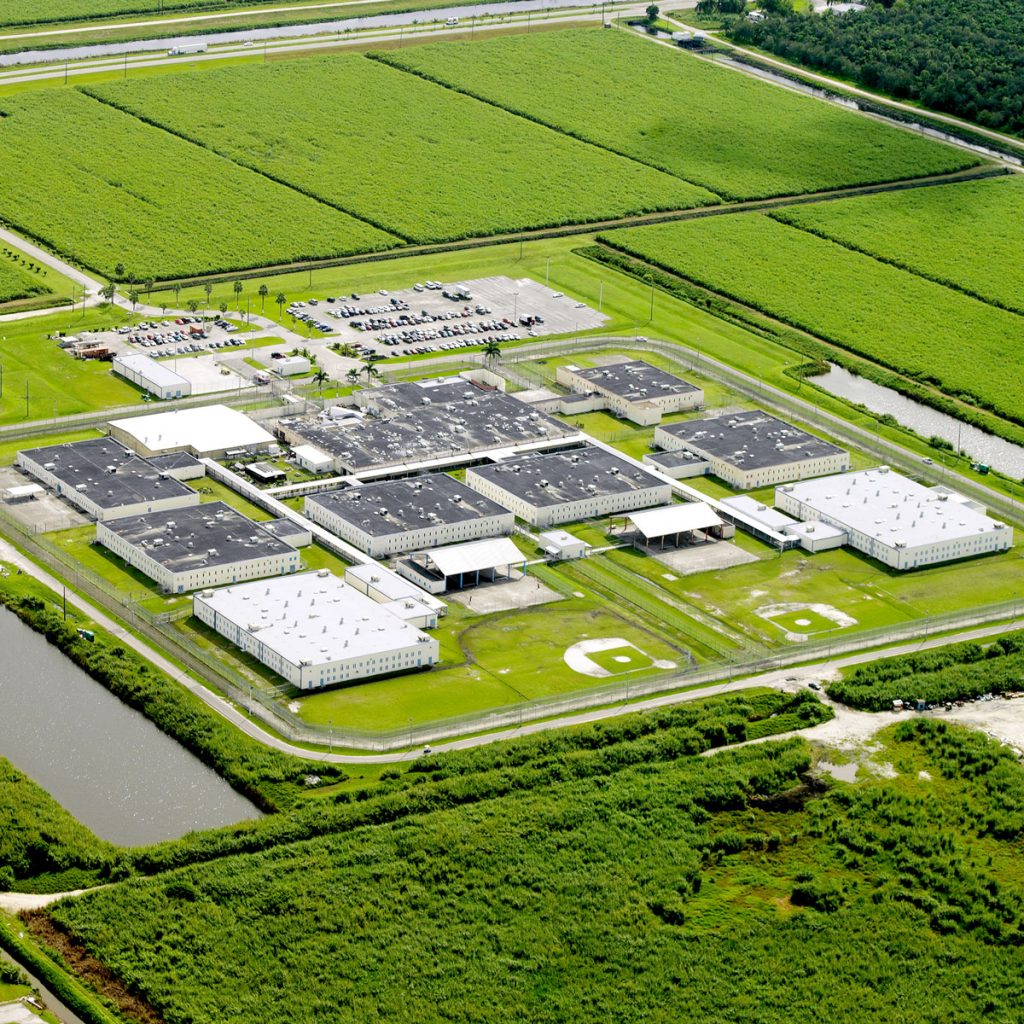
South Bay Correctional and Rehabilitation Facility – 600 US Highway 27 S, South Bay, FL 33493 – Capacity: 1,948 – Client: Florida Department of Management Services (FL DMS)
It’s really been devastating to not only him personally, but also to his family-based community at South Bay, and to its faith-based community especially.”
CLR: Tell me about Richard and his role as an inmate at South Bay.
CJ: “The inmates in Richard’s dorm lovingly refer to him as ‘Uncle Richie’ and look up to him, some even for mentorship. The others who are also incarcerated do try to keep distance between themselves and him, because they are actively trying to prevent him from contracting COVID-19.
Unfortunately for Richard and his fellow inmates, the environment of a prison added to the highly contagious nature of this virus is not a good combination. Once COVID-19 starts to spread in the prison, any prison, it is hard to contain. So we are obviously concerned for his health and safety during this uncertain time.”
Richard DeLisi has been quoted several times as saying, “I am remorseful for everything that I have done that is not lawful.” According to the July 2020 Richard DeLisi profile by Leafly, “Clemency is exactly what we are asking Governor DeSantis to do for Richard DeLisi, that he be merciful and grant Richard’s release from this potential death sentence.”
When President Donald Trump commuted the sentence of Alice Marie Johnson, another nonviolent offender serving a life sentence, they put out a statement saying, “While this Administration will always be very tough on crime, it believes that those who have paid their debt to society and worked hard to better themselves while in prison deserve a second chance.”
In October 2019, Johnson herself penned a USA Today article, in which she agrees, saying “My life was saved by many fighting for justice reform. I want to save the lives of other prisoners who are nonviolent but still incarcerated.”
CLR: On the topic of release and freedom, why is his brother, Ted DeLesi, out of prison while Richard is not? Tell me about their strong family ties?
CJ: “Ted successfully appealed his conspiracy charge which is why he only served 25 years & Richard remains incarcerated. He also combines the details of the second case, for which Richard remains incarcerated, & the first case where Ted was found to have even greater culpability & served more time. It’s confusing even if you aren’t 79.
To make things even more confusing, for Ted & everyone, there are a lot of people with the same names involved in the cases— Chucky Sr. was a co-defendant in the first case while Chucky Jr. was in the second, thought at first he was mistaken for his father who was on the run from the first case.
The patriarch of the whole family was also a Ted (I believe there were 4 generations of ‘Ted’s’), and Richard’s eldest is also a Richard.
One of the first things I did was make a family tree. They grew up in the tight knit community of Breezy Point, NY, so there are a lot of the same names in their friend group. Richard’s case was appealed a few years ago in Polk county by Richard Rosenbaum who wrote a detailed motion [that can be publicly viewed through] the Polk County Clerk’s website.”
CLR: When is Richard’s current official release date as of August 17, 2020?
CJ: “We go by the posted date at the prison and on paper, and Richard’s release date is currently set for August 6, 2022. The most challenging fact for us is that due to COVID-19, that day may never come for him.”
CLR: Where does the case currently stand for Richard?
CJ: “Clemency is his final refuge and the best outcome we could hope for: his freedom. That could quite literally save Richard’s life, not to mention saving you and other Floridians around $70,000 per year.”
CLR: What would you truly like to highlight for the reader?
MD: “STAY INFORMED– to learn more about Richard’s case and legal team, see the 2 articles featured on LPP’s blog.”
CJ: “Those who participate in the cannabis industry are doing so on the backs of our traditional market operators, and unregistered patients, who remain behind bars as Prisoners of the Drug War. No flower is as sweet when you think of all of the tears shed for that plant by the incarcerated & their families. We all must do what we can until. We will never be able to recalculate all of the sentences that counted cannabis priors upping the sentences.”
How to help free Richard DeLisi
- Emailing Florida Gov. Ron DeSantis and urging him to grant clemency to Richard DeLisi at the following email address: [email protected]
- Learning more about Richard DeLisi and fellow drug war prisoners through the Last Prisoner Project
- Spreading the word about Richard DeLisi via your personal social media platforms
- Writing DeLisi personally at the following address:
Florida- South Bay Correctional Facility
Richard DeLisi
DOC #087624
600 U.S. Highway 27
South Bay, Florida
33493-2233
Remarks by Richard made to Leafly in July 2020:
“There is not one single day that passes by that I don’t regret the terrible mistakes I made in 1988 that have haunted me for many years of my life, that caused me (to lose) the most precious and fundamental rights of our constitution: freedom, life and liberty.
While incarcerated, I have made the most of my time, pursuing every possible opportunity to better myself in the hopes of returning to society as a productive member.
I am a man of faith and well fit for society. I have fully and sincerely acknowledged that my bad faith decisions and unlawful actions were wrong and outside the law.
I acknowledge the terrible pain, shame, and hurt I have caused to my loved ones from my “bad faith” decisions and unlawful actions. They hurt and suffer dearly with me in this painful and long journey of incarceration.
I offer up no excuses for my wrongdoing, but only hope for that of mercy. If only I could go back in time and be given the chance to relive that year, I would do it totally different – I would be eager to undo this terrible mistake. But I cannot relive that year, nor do I have the power to change what happened.
Fortunately, I have the power to make a change for the better and just maybe there’s hope for a future that would afford me the opportunity to make up the shame, hurt, pain, and many, many years of suffering I’ve caused.
I come seeking “true mercy” and “relief” from the only man that is capable of relieving me and my family of such a heavy burden; that I may obtain mercy, and be allowed to go on with life a free and productive citizen of the State of Florida for whatever remainder of years that be upon my life, to share it preciously and sincerely with my children.”
Reading for Context on DeLisi:
- Meet Richard DeLisi – The Longest Serving Nonviolent Prisoner in the United States for Cannabis, Last Prisoner Project, Mariah Daly • June 29, 2020
- Richard DeLisi, 71, suffers in a Florida prison while others make millions on marijuana, Leafly, Fatma Khaled • July 26, 2020
- Meet the Americans Serving Life in Jail for Weed, Miami New Times, Allie Conti • October 2014
- How you can help,FreeDeLisi.com
- Trump granted me clemency, others deserve the same, USA Today, Alice Marie Johnson • January 2019
- Last Prisoner Project Teams with Minardi Law for Release of Longest Serving Non-Violent Prisoner in the US
